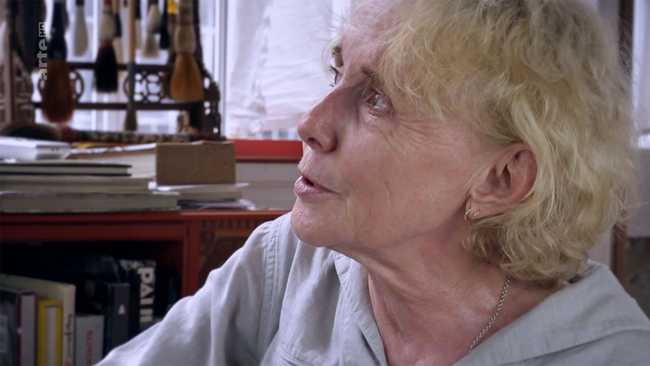Interviews: Denis, Benning, and More

“Although her oeuvre to date is wide-ranging,” writes Melissa Anderson at 4Columns, Claire Denis’s “most celebrated films are those that probe, usually elliptically, the legacy of French colonial rule in Africa, as seen in Chocolat (1988), her semiautobiographical debut feature; Beau Travail (1999), her superb gloss on Billy Budd; and White Material (2009), a hallucinatory tale of a coffee-plantation owner blind to the civil war raging around her played by Isabelle Huppert. Even Denis’s more outlandish works, like the gore-soaked and desire-drenched Trouble Every Day (2001), her intervention in the vampire film, cohere with their ineradicable mood and texture. Denis is so great a filmmaker that despite my lack of enthusiasm for the key components of her latest movie”—Anderson is no fan of Juliette Binoche, “I found myself frequently enchanted by Let the Sunshine In. It’s a film intelligently attuned both to the endless possibilities of what can happen when two people are in the same space together—a bed, a bar, a restaurant, a car—and to the ever expanding and contracting gulf between them.”
Let the Sunshine In, which will see a limited release next week in the U.S., arrives in the UK today and, for Little White Lies,Sophie Monks Kaufman asks Denis about one visual and one audial nod to Etta James. Denis: “Etta James was the exemplary woman for the film. When I first spoke to Juliette I told her, ‘You have to consider Etta James, what kind of a woman she was.’ She wanted more love—more and more. . . . She is a wild, wild woman screaming for love.” For the BFI, Kaufman revisits ten “great films about female desire” and Amy Simmons presents a Claire Denis primer. Those fluent in French may want to watch Arte’s interview with Denis (15’39”) from which the image above is taken.
“I’m not very interested in cinema at all anymore, it’s too confining for me,” James Benning told Maximilien Luc Proctor recently in Berlin. “And there’s too much arguing between the dominant cinema and people that are working outside of the dominant cinema. They shouldn’t even be talking. I have no understanding why. Their needs are completely different.” You’ll find the full interview at photogénie.
Sofia Coppola was recently at the Harvard Film Archive for a screening of The Beguiled (2017) and took part in a Q&A with HFA curator Haden Guest. Sean Burns has taken notes: “There were things I connected to that reminded me of my first film, The Virgin Suicides. It was like The Virgin Suicides but it wasn’t just teenage girls now. There was also the teacher and the headmistress and I thought it would be so interesting to look at the power dynamics not just between men and women but between these women at different stages of their lives.” On a related note, at the Notebook, Meredyth Cole writes that Marie Antoinette (2006) “may look like it’s selling something, but it’s pushing revolution.”
At the Quietus, Robert Barry talks with cinematographer Chris Menges (Kes,Local Hero,The Killing Fields) about the impact that Milos Forman and cinematographer Miroslav Ondříček’s work together had on Lindsay Anderson and why Anderson’s If.... (1968) “was a very important film for me.”
“For the final installment of his so-called ‘trilogy of evil,’ which began in 1974 with General Idi Amin Dada, Barbet Schroeder profiles Buddhist monk Ashin Wirathu—one of the calmly speaking, saffron-robed leaders of the ongoing genocide against Rohingya Muslims in Myanmar.” Devika Girish talks with Schroeder about The Venerable W.
Also for Film Comment,Matt Morrison interviews Tamer El Said, director of In the Last Days of the City, “part diary and part documentary, its tone by turns dusky meditation and volcanic alarm.” It opens on April 27 at MoMA before rolling on to Los Angeles.
For news and items of interest throughout the day, every day, follow @CriterionDaily.



